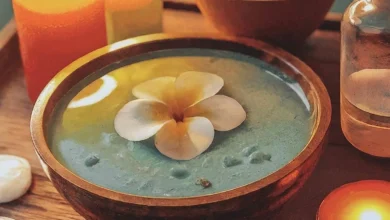DIY Beauty: Natural Skincare Making Skills for a Glowing You

I. Introduction
Did you know that the average person applies over 100 chemicals to their skin daily through commercial skincare products? That’s a shocking number! But don’t worry – there’s a simple solution.
Take Control of Your Skin Health
You can decide what goes on your skin by making your own natural skincare products at home. It’s easier than you might think!
Welcome to DIY Natural Skincare
In this post, we’ll explore the exciting world of homemade beauty products. You’ll discover:
- How to use natural skincare ingredients
- Simple techniques for creating effective products
- Ways to personalize your skincare routine
Why Natural Skincare Matters
Making your own skincare products isn’t just fun – it’s good for you and the planet. You’ll create products that:
- Nourish your skin
- Align with your health values
- Support sustainability
Ready for Glowing, Healthy Skin?
Get ready to unlock the secrets to a naturally radiant you. Let’s start your journey into the world of DIY natural skincare!
II. Why Choose Natural DIY Skincare?

Embracing the Natural Beauty Revolution
Have you ever wondered why more and more people are turning to natural, homemade skincare solutions? Let’s explore the compelling reasons behind this growing trend.
A. Benefits of Natural Ingredients
Natural ingredients offer a wealth of advantages for your skin and overall well-being. Here are the top 5 benefits of choosing natural DIY skincare:
- Fewer Harsh Chemicals: You control what goes into your products, avoiding potentially harmful additives.
- Customization: Tailor your skincare to your unique needs and preferences.
- Cost-Effectiveness: Save money by making larger quantities of high-quality products at home.
- Freshness: Create small batches for maximum potency and effectiveness.
- Transparency: Know exactly what you’re putting on your skin – no mystery ingredients!
B. Environmental Impact
Caring for Your Skin and the Planet
By choosing natural DIY skincare, you’re not just benefiting your skin – you’re also making an eco-friendly choice. Here’s how:
- Reduced Packaging Waste: Reuse containers for your homemade products.
- Lower Carbon Footprint: Fewer products shipped means less transportation-related pollution.
- Sustainable Ingredients: Many natural ingredients are renewable and biodegradable.
C. Connection with Self-Care Rituals
Nurturing Body and Mind
Creating your own skincare products can be a deeply rewarding experience that goes beyond skin health:
- Mindfulness: The process of making your own products can be meditative and calming.
- Personal Touch: Each product you make carries your unique energy and intention.
- Sense of Accomplishment: Feel proud of creating something beneficial for yourself.
By choosing natural DIY skincare, you’re not just caring for your skin – you’re embracing a holistic approach to beauty and well-being.
III. Essential Tools and Equipment

Gearing Up for DIY Skincare Success
Before you dive into creating your own natural skincare products, it’s important to have the right tools on hand. Don’t worry – you won’t need anything fancy or expensive. Most of these items are probably already in your kitchen!
Your DIY Skincare Toolkit
Here’s a list of basic tools you’ll need to get started:
- Mixing bowls (glass or stainless steel)
- Measuring spoons and cups
- Digital kitchen scale
- Hand mixer or whisk
- Storage containers (glass jars or bottles)
- Funnel
- Spatula
- Double boiler or heat-safe glass bowl
- Labels and marker
Why These Tools Matter
Let’s break down why each of these items is important:
- Mixing bowls: Use glass or stainless steel bowls to avoid any reactions with your ingredients. They’re easy to clean and won’t retain odors.
- Measuring tools: Accurate measurements are key to successful formulations. Invest in a good set of measuring spoons and cups.
- Digital kitchen scale: For precise measurements, especially when working with solid ingredients like butters or waxes.
- Hand mixer or whisk: Essential for blending ingredients smoothly and creating emulsions.
- Storage containers: Glass jars or bottles are best for storing your creations. They’re non-reactive and help preserve your products.
- Funnel: Makes it easy to transfer your products into bottles without mess.
- Spatula: Helps you scrape every last bit of your precious creations from your mixing bowl.
- Double boiler: Useful for gently melting ingredients like beeswax or cocoa butter.
- Labels and marker: Always label your creations with the name and date made. This helps you keep track of what’s what and when it might expire.
Remember: Cleanliness is crucial in DIY skincare. Always start with clean tools to ensure your products stay fresh and safe to use.
With these basic tools in your arsenal, you’ll be well-equipped to start your DIY natural skincare journey. In the next section, we’ll explore the key ingredients you’ll be working with.
IV. Key Ingredients for Natural Skincare

Nature’s Beauty Toolbox
Understanding the ingredients you’ll be working with is crucial for creating effective, natural skincare products. Let’s explore the key components that will form the foundation of your DIY beauty routine.
A. Base Ingredients
These form the bulk of your products and carry other ingredients. Here’s a quick look at some common bases:
| Base | Benefits |
|---|---|
| Coconut Oil | Moisturizing, antimicrobial |
| Shea Butter | Nourishing, anti-inflammatory |
| Jojoba Oil | Balancing, similar to skin’s natural oils |
| Aloe Vera Gel | Soothing, hydrating |
| Sweet Almond Oil | Lightweight, rich in vitamins |
B. Active Ingredients
These provide specific benefits to address various skin concerns. Popular natural actives include:
- Essential oils (e.g., lavender, tea tree)
- Herbs (e.g., chamomile, calendula)
- Clays (e.g., kaolin, bentonite)
- Vitamin E oil
- Rosehip seed oil
Remember: Always research proper usage and dilution rates for active ingredients, especially essential oils.
C. Preservatives and Emulsifiers
While we aim for natural products, some ingredients are necessary for safety and texture:
Natural Preservatives:
- Vitamin E (also an antioxidant)
- Rosemary extract
- Grapefruit seed extract
These help prevent bacterial growth in water-based products, extending shelf life.
Natural Emulsifiers:
- Beeswax
- Lecithin
- Borax (in small amounts)
Emulsifiers help mix oil and water-based ingredients, creating stable lotions and creams.
Why They Matter:
- Preservatives keep your products safe from harmful bacteria.
- Emulsifiers ensure your product has a smooth, consistent texture.
Pro Tip: For beginners, start with simple, oil-based products that don’t require preservatives or emulsifiers. As you gain experience, you can move on to more complex formulations.
By understanding these key ingredients, you’re well on your way to creating effective, natural skincare products tailored to your needs. In the next section, we’ll dive into the basic skills you’ll need to bring these ingredients together.
V. Basic Skills for DIY Skincare Making

Mastering the Essentials
Creating your own skincare products is like being a chef in your beauty kitchen. Let’s explore the fundamental skills you’ll need to whip up effective and safe natural skincare concoctions.
A. Proper Ingredient Measuring
Accuracy is Key
- Use a digital scale for solid ingredients (like butters and waxes)
- Use measuring spoons or cups for liquids
- Be precise – even small variations can affect your final product
Pro Tip: Write down exact measurements as you go. This helps you replicate successful recipes later.
B. Mixing Techniques
Different products require different mixing methods. Here’s a step-by-step guide for various consistencies:
For Oils and Serums:
- Combine ingredients in a clean bowl
- Stir gently with a spoon or whisk until well blended
For Creams and Lotions:
- Heat oil-based and water-based ingredients separately
- Slowly add water-based to oil-based while whisking continuously
- Use a hand mixer for a smoother emulsion
For Balms and Salves:
- Melt solid ingredients (like beeswax) using a double boiler
- Remove from heat and stir in oils and other ingredients
- Pour into containers and let cool
C. Sterilization and Hygiene Practices
Safety First
Keeping your tools and workspace clean is crucial for creating safe, long-lasting products. Follow these key steps:
- Wash all tools with hot, soapy water before use
- Rinse thoroughly and dry with a clean towel
- Sterilize glass containers by boiling for 10 minutes
- Use rubbing alcohol to sanitize plastic containers and lids
- Always work with clean hands in a clean environment
- Avoid introducing water into oil-based products to prevent bacterial growth
Remember: Good hygiene practices are essential for preventing contamination and ensuring your products are safe to use.
By mastering these basic skills, you’re setting a strong foundation for your DIY skincare journey. Practice makes perfect, so don’t be discouraged if your first attempts aren’t flawless. With time, you’ll become more confident in your abilities.
VI. Simple DIY Skincare Recipes to Get Started

Your First Steps into DIY Skincare
Now that you’ve learned about ingredients and basic techniques, it’s time to put your knowledge into practice. Let’s start with three simple recipes that will form the foundation of your natural skincare routine.
A. Facial Cleanser
Gentle Honey Cleansing Gel
Ingredients:
- 1/4 cup raw honey
- 1/4 cup distilled water
- 1 tablespoon liquid castile soap
- 5 drops lavender essential oil (optional)
Steps:
- In a small bowl, mix honey and warm distilled water until well combined.
- Slowly stir in the castile soap.
- Add lavender essential oil if using, and mix gently.
- Pour into a clean pump bottle.
Customization options:
- For oily skin: Add 2-3 drops of tea tree oil
- For dry skin: Replace water with rose water
B. Moisturizer
Simple Shea Butter Face Cream
Ingredients:
- 1/4 cup shea butter
- 2 tablespoons jojoba oil
- 5 drops vitamin E oil
- 5 drops essential oil of choice (optional)
Steps:
- Melt shea butter using a double boiler.
- Remove from heat and stir in jojoba oil.
- Let cool slightly, then add vitamin E and essential oil if using.
- Whip the mixture with a hand mixer until light and fluffy.
- Transfer to a clean jar.
C. Face Mask
Soothing Oatmeal and Honey Mask
Ingredients:
- 2 tablespoons ground oats
- 1 tablespoon raw honey
- 1 teaspoon water
Steps:
- Mix all ingredients in a small bowl until you have a paste.
- Apply to clean, damp skin.
- Leave on for 10-15 minutes.
- Rinse off with warm water, massaging gently for mild exfoliation.
Customization options:
- For brightening: Add 1 teaspoon lemon juice
- For extra hydration: Replace water with mashed avocado
Pro Tips:
- Always do a patch test before using new products on your face.
- These recipes don’t contain preservatives, so make small batches and use within 1-2 weeks.
- Store your creations in a cool, dark place to maintain freshness.
These simple recipes are perfect for beginners and will give you a taste of the wonderful world of DIY skincare. As you gain confidence, you can experiment with different ingredients and formulations to suit your specific skin needs.
VII. Advanced Techniques for Natural Skincare Enthusiasts

Taking Your DIY Skincare to the Next Level
As you become more comfortable with basic recipes, you might want to explore more complex techniques. These advanced skills will allow you to create professional-quality products tailored to your specific needs.
A. Emulsification Process
Creating Stable Water-and-Oil Mixtures
Emulsification is key to making lotions and creams that don’t separate. Here’s a brief explanation:
- What is emulsification?
It’s the process of mixing water and oil-based ingredients so they stay blended. - Why is it important?
• Creates smooth, creamy textures
• Ensures even distribution of ingredients
• Prevents separation of water and oil phases - Basic emulsification steps:
• Heat oil and water phases separately
• Add an emulsifier (like beeswax or emulsifying wax)
• Combine phases at the same temperature (around 70°C/158°F)
• Blend with a stick blender or hand mixer
• Continue mixing while cooling to room temperature
B. Creating Stable Formulations
Tips for Achieving the Right Texture and Shelf Life
- Use preservatives in water-based products to prevent bacterial growth
- Measure ingredients by weight for accuracy
- Understand the role of each ingredient in your formula
- Test pH levels and adjust if necessary (ideal range: 4.5-5.5 for most skincare)
- Conduct stability tests by observing your product over time in different conditions
C. Incorporating Active Ingredients Effectively
Guidelines for Maximizing Benefits Without Irritation
- Start with low concentrations and gradually increase
- Understand interactions between different active ingredients
- Consider the pH requirements of active ingredients
- Use ingredients at their recommended temperatures
- Add heat-sensitive ingredients (like vitamin C) at the cooling phase
Pro Tip: Keep a detailed formulation journal. Record every recipe, including exact measurements, process, and results. This will help you refine your formulas over time.
Remember: Advanced techniques require more knowledge and precision. Always research thoroughly and consider taking a course in cosmetic formulation for in-depth understanding.
By mastering these advanced techniques, you’ll be able to create a wider range of products and have more control over their properties. However, don’t rush – take your time to build your skills gradually.
VIII. Customizing Your DIY Skincare

Tailoring Your Creations to Your Unique Skin
One of the biggest advantages of DIY skincare is the ability to create products perfectly suited to your skin’s needs. Let’s explore how to customize your formulations effectively.
A. Understanding Your Skin Type
Knowing your skin type is crucial for choosing the right ingredients. Here’s a quick guide:
| Skin Type | Characteristics | Suitable Ingredients |
|---|---|---|
| Oily | Shiny, prone to acne | Witch hazel, tea tree oil, clay |
| Dry | Flaky, tight-feeling | Shea butter, hyaluronic acid, jojoba oil |
| Combination | Oily T-zone, dry cheeks | Aloe vera, grapeseed oil, niacinamide |
| Sensitive | Easily irritated, redness | Chamomile, calendula, oatmeal |
| Normal | Balanced, few issues | Rosehip oil, vitamin E, green tea extract |
B. Addressing Specific Skin Concerns
Beyond skin type, you may have particular issues you want to target. Here are some common concerns and natural remedies:
- Acne: Tea tree oil, salicylic acid from willow bark
- Aging: Rosehip oil, vitamin C, CoQ10
- Hyperpigmentation: Licorice root extract, kojic acid
- Dryness: Hyaluronic acid, glycerin, squalane
- Redness: Aloe vera, centella asiatica, zinc oxide
Pro Tip: Start with small amounts of active ingredients and gradually increase as your skin adjusts.
C. Seasonal Adjustments to Your Routine
Your skin’s needs change with the seasons. Here’s how to adapt:
Summer:
- Lighter, oil-free moisturizers
- Increased use of antioxidants (vitamin C, green tea)
- Addition of natural SPF ingredients (zinc oxide, red algae)
Winter:
- Richer, more emollient creams
- Focus on hydration (hyaluronic acid, ceramides)
- Gentle exfoliation to combat dryness
Spring/Fall:
- Transitional products with medium weight
- Balancing ingredients (niacinamide, probiotics)
Remember: Listen to your skin. It’s okay to adjust your routine as needed, even within a season.
By customizing your skincare, you’re creating a routine that’s uniquely yours. Don’t be afraid to experiment, but always introduce new ingredients slowly and one at a time. This way, you can easily identify what works best for your skin.
IX. Safety Considerations in DIY Skincare

Keeping Your Skin Safe and Happy
While natural ingredients are generally safe, it’s crucial to follow proper safety practices when creating your own skincare products. Let’s explore some key considerations to ensure your DIY creations are both effective and safe.
A. Patch Testing
Step-by-Step Guide for Safe Product Testing
- Choose a test area: Inner forearm or behind the ear
- Apply a small amount: Use a pea-sized portion of your product
- Cover the area: Use a bandage if needed
- Wait and observe: Leave for 24-48 hours
- Check for reactions: Look for redness, itching, or swelling
- Interpret results: No reaction? It’s likely safe to use
Remember: Always patch test new products, even if you’ve used the ingredients before. Combinations can sometimes cause unexpected reactions.
B. Shelf Life and Storage
Tips for Prolonging Product Efficacy
- Use clean, sterilized containers
- Store in a cool, dark place
- Use airless pumps for products with delicate ingredients
- Label with date of creation
- Follow these general shelf life guidelines:
• Oil-based products: 3-6 months
• Water-based products with preservatives: 3-6 months
• Products without preservatives: Use within 1-2 weeks, store in refrigerator
Pro Tip: When in doubt, trust your senses. If a product changes color, smell, or texture, it’s best to discard it.
C. Potential Allergies and Sensitivities
Common Allergens to Be Aware Of
- Essential oils: Especially citrus oils
- Nut oils: Like sweet almond or macadamia
- Fragrances: Even natural ones can cause reactions
- Plant extracts: Particularly if you have pollen allergies
- Lanolin: Derived from sheep’s wool
Best Practices:
- Always disclose ingredients if sharing products
- Start with small amounts of new ingredients
- Be extra cautious with products used around eyes or on lips
Remember: Natural doesn’t always mean hypoallergenic. Everyone’s skin is different, so what works for one person may not work for another.
By following these safety guidelines, you can enjoy the benefits of your DIY skincare creations with peace of mind. Always prioritize safety over experimentation, and don’t hesitate to consult a dermatologist if you have concerns.
X. Scaling Up: From Hobbyist to Home Business

Turning Your Passion into a Profession
If you’ve fallen in love with creating natural skincare products, you might be considering turning your hobby into a business. Here’s what you need to know to take that exciting step.
A. Legal Considerations
Navigating the Regulatory Landscape
- Research local regulations: Laws vary by country and even state
- Understand product claims: Be careful about making medical claims
- Get proper licensing: Business license, seller’s permit, etc.
- Consider insurance: Product liability insurance is crucial
- Comply with labeling requirements: Ingredient lists, warnings, etc.
Remember: Consult with a lawyer familiar with cosmetic regulations to ensure full compliance.
B. Packaging and Labeling Basics
Creating a Professional Look
- Choose appropriate containers: Consider product type, shelf life, and aesthetics
- Design eye-catching labels: Include all required information
- Consider eco-friendly options: Recyclable or reusable packaging
- Ensure proper sealing: To prevent contamination and leakage
- Include usage instructions and best-by dates
Pro Tip: Your packaging is often the first thing customers see. Make sure it reflects your brand’s values and aesthetics.
C. Building a Product Line
Creating a Cohesive Range
- Start small: Begin with 3-5 core products
- Ensure product synergy: Create items that work well together
- Consider different skin types: Offer options for various needs
- Develop a signature ingredient or blend to set your brand apart
- Plan for scalability: Ensure you can produce larger quantities
Key Steps:
- Conduct market research to identify gaps and opportunities
- Develop a clear brand identity and story
- Set up a simple e-commerce website or online store
- Start building a social media presence
- Consider local markets or craft fairs to test your products
Remember: Growing a business takes time. Be patient and focus on creating quality products and building relationships with your customers.
As you transition from hobbyist to entrepreneur, keep your passion for natural skincare at the forefront. Your enthusiasm and dedication to quality will be key to your success.
XI. Conclusion

Embracing Your Natural Skincare Journey
Congratulations! You’ve just taken a deep dive into the world of DIY natural skincare. Let’s recap the key skills you’ve learned:
- Choosing the right ingredients for your skin
- Mastering basic and advanced techniques
- Creating custom formulations
- Ensuring safety in your skincare routine
- Considering the potential for scaling up your hobby
Your DIY Skincare Toolbox
You now have the knowledge to:
- Create cleansers, moisturizers, and masks tailored to your needs
- Understand the science behind effective skincare formulations
- Safely experiment with natural ingredients
- Potentially turn your passion into a small business
The Power of Natural Beauty
By making your own skincare products, you’re not just pampering your skin – you’re making a choice that benefits your health and the environment. You’re taking control of what goes on your skin and reducing your exposure to unnecessary chemicals.
Your Next Steps
We encourage you to start small:
- Try one of the simple recipes we’ve shared
- Experiment with customizing it to your skin’s needs
- Keep a journal of your creations and how your skin responds
Remember: DIY skincare is a journey, not a destination. It’s about learning, experimenting, and finding what works best for you.
Share Your Experience
We’d love to hear about your DIY skincare adventures! Have you tried making your own products? What worked well? What challenges did you face? Share your stories in the comments below or on our social media channels.
Stay Connected
For more tips, recipes, and natural skincare inspiration, don’t forget to:
- Subscribe to our newsletter
- Check back for future blog posts on specific ingredients and techniques
Here’s to your glowing, naturally beautiful skin!



